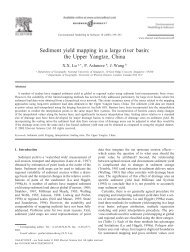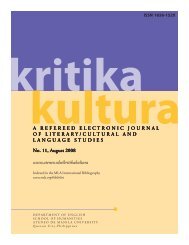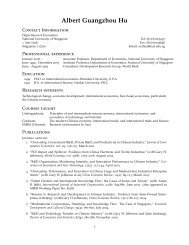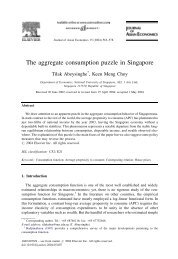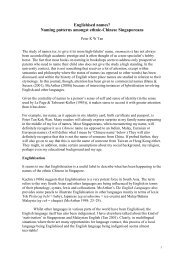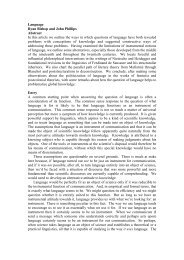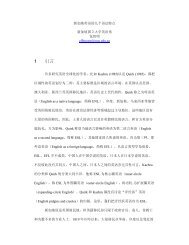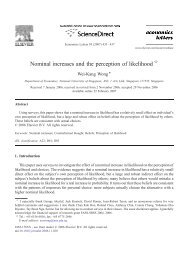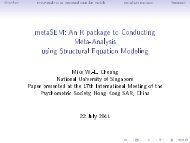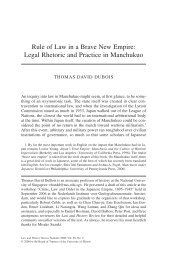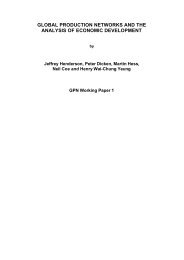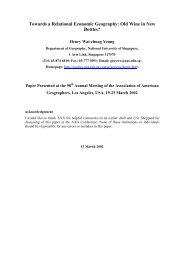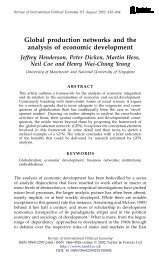Researching Hybridity in Social and Economic ... - NUS Home
Researching Hybridity in Social and Economic ... - NUS Home
Researching Hybridity in Social and Economic ... - NUS Home
You also want an ePaper? Increase the reach of your titles
YUMPU automatically turns print PDFs into web optimized ePapers that Google loves.
hoc <strong>in</strong> nature. Methodological pragmatism <strong>and</strong> improvisation are my rule of the thumb. To<br />
beg<strong>in</strong>, I th<strong>in</strong>k it is necessary to expla<strong>in</strong> one of the most significant data constra<strong>in</strong>ts of my<br />
project – the secretive nature of Ch<strong>in</strong>ese bus<strong>in</strong>ess. Similar to a number of other m<strong>in</strong>ority<br />
diaspora groups, family bus<strong>in</strong>ess for ethnic Ch<strong>in</strong>ese outside ma<strong>in</strong>l<strong>and</strong> Ch<strong>in</strong>a has a historical<br />
existence of be<strong>in</strong>g a “total <strong>in</strong>stitution” encompass<strong>in</strong>g both cultural <strong>and</strong> economic roles. The<br />
family bus<strong>in</strong>ess serves dual functions – as a provider to the founder <strong>and</strong> (almost always) his<br />
immediate family members, <strong>and</strong> as an employer of his family members <strong>and</strong> trusted<br />
“lieutenants” (Wong, 1988; Redd<strong>in</strong>g, 1990; Brown, 2000). Although Ch<strong>in</strong>ese family bus<strong>in</strong>ess<br />
has experienced some degree of <strong>in</strong>ternal transformation <strong>in</strong> an era of globalization, the<br />
centrality of the family <strong>in</strong> Ch<strong>in</strong>ese bus<strong>in</strong>ess rema<strong>in</strong>s relatively <strong>in</strong>tact.<br />
**************<br />
Figure 1 here<br />
**************<br />
What then expla<strong>in</strong>s the secretive nature of Ch<strong>in</strong>ese family bus<strong>in</strong>ess? First, because of<br />
the central role of the family <strong>in</strong> Ch<strong>in</strong>ese bus<strong>in</strong>ess, there is a significant degree of<br />
<strong>in</strong>ternalization of <strong>in</strong>formation with<strong>in</strong> the family. This results <strong>in</strong> strong cooperation with<strong>in</strong><br />
family groups <strong>and</strong> networks, but fierce competition among different bus<strong>in</strong>ess groups <strong>and</strong><br />
networks. 5 Trust <strong>and</strong> <strong>in</strong>formation are highly important to bus<strong>in</strong>ess success <strong>and</strong> thus normally<br />
only family members are granted exclusive rights to such <strong>in</strong>formation. Second, the host<br />
countries <strong>in</strong> which Ch<strong>in</strong>ese family bus<strong>in</strong>ess operates (e.g. Southeast Asia) tend to be hostile to<br />
this ethnic organization of economic activities for various political <strong>and</strong> <strong>in</strong>stitutional reasons<br />
(Hamilton, 1991; McVey, 1992; Hodder, 1996; Chirot <strong>and</strong> Reid, 1997; Douw et al., 2001).<br />
The <strong>in</strong>ternalization of <strong>in</strong>formation with<strong>in</strong> the family becomes an important mechanism to<br />
protect one’s family <strong>and</strong> bus<strong>in</strong>ess from external threats from local states <strong>and</strong> dom<strong>in</strong>ant ethnic<br />
groups. This m<strong>in</strong>dset among ethnic Ch<strong>in</strong>ese <strong>in</strong> Southeast Asia, for example, has been<br />
12



